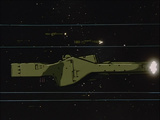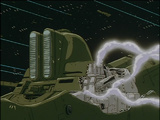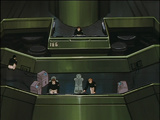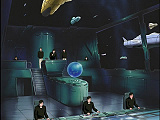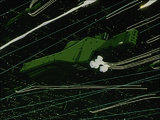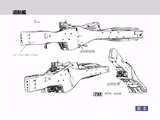Alliance cruiser (788 UC era)
From Gineipaedia, the Legend of Galactic Heroes wiki
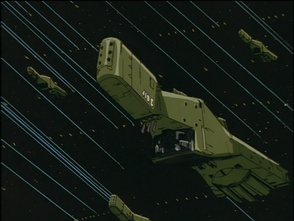 A standard Alliance cruiser (801 UC (3 NIC / 492 IC / 3601 CE)) | |
| Affiliation: | Iserlohn Republic El Facil Revolutionary Government Free Planets Alliance |
| Type: | Cruiser |
| Length: | 372 metres (FFC2) |
| Width: | 94.5 metres (FFC2) |
| Height: | 74 metres (FFC2) |
| Armament: | 6 12 cm neutron beam cannons 2 4 cm railguns 8 multiple missile launchers 2 external hardpoints 3 Spartanian fighters 1 shuttle |
| Crew: | 393 (FFC2) |
This Alliance cruiser (Japanese:巡航艦) design served as the standard cruiser design of Alliance fleets from the late stages of the Alliance–Imperial War to at least 801 UC (3 NIC / 492 IC / 3601 CE), under the successor states of the El Facil Revolutionary Government and Iserlohn Republic.
Contents |
Design
The standard Alliance cruiser design shared many design similarities with other Alliance designs. It was essentially rectangular in shape with a box-like prow mounting the main weapons and one main engine in the rear. It was distinguishable from the standard Alliance battleship visually by the horizontal layout of the engine panelling compared to the vertical layout of the battleship.
It mounted 6 neutron beam cannons in the front as its main armament. Secondary weapons include missile launchers, of which 6 were located in the ventral hull. It carried 3 Spartanian fighters in its ventral hull in a half open hangar design, which left the majority of the fighters protruding into space. They were launched by being propelled rearward out of their hangars first. (LOGH: 'The Battle of Amritsar Starzone', 'The Battle of Vermilion (Part One)')
There were two styles of bridges. One was similar to that of Alliance standard battleships, consisting of an elevated command balcony level, for the captain and other senior officers, attached to a central column with stairwells and elevators, while bridge crew occupied the lower level. The second style bridge was similar to that of the Leda II and consisted of a command deck slightly higher and recessed into the rear of the bridge than the bridge crew deck below. As the Leda II was a newer cruiser design meant to herald a new generation of cruisers, its bridge layout was the newer design. (LOGH: 'The Crimson Star Road', TBT: 'Part One')
Role and Capabilities
The Alliance cruiser was a workhorse design and filled a variety of roles from serving in the main battle lines, to escort duties, to independent patrols, to transporting military personnel.
Like all Alliance warships, it was not capable of directly landing on planets.
In the Battle of Shiva, the Iserlohn Republic suffered from manpower shortages and had to operate some ships with less than a full crew. Modifications were made to the cruiser design with numerous functions in the ship linked to the bridge crew stations, allowing a skeleton crew of 52 to operate the entire cruiser, albeit with difficulty. ('The Crimson Star Road')
Cruisers are commonly commanded by commanders and a lieutenant commander serving as its executive officer.
Gallery
Port (799 UC (1 NIC / 490 IC / 3599 CE)) |
Sensor dome and exposed internal structure (801 UC (3 NIC / 492 IC / 3601 CE)) |
First style of bridge (801 UC (3 NIC / 492 IC / 3601 CE)) |
Second style of bridge (795 UC (486 IC / 3595 CE)) |
Launching ventral missiles (799 UC (1 NIC / 490 IC / 3599 CE)) |
Decoy launch (795 UC (486 IC / 3595 CE)) |
Appendices
Licensed sources
The standard Alliance cruiser was the most numerous of all standard Alliance warship designs. It used standardised modular components and the construction process was heavily automated, allowing for reduced construction and maintenance costs as well as a construction time as short as 1 to 2 months per ship.
It mounted 6 NMC12-10 neutron beam cannons as its main armament. These had a calibre of 12.30 cm and an estimated maximum effective range of 18 light seconds. It mounted 2 external hardpoints outside its main armour plating that could be fitted with a variety of weapons to suit the mission role. These ranged from electron beam cannons and lasers to missile launchers. Situated on the sides of the hull were point defence cannons for use against enemy fighters. On Alliance ships of cruiser size and above, these point defence weapons were electron beam cannons. (Data Book: Mechanic & Seiyū Encyclopaedia, p. 138, 179, 180)
Underneath the main cannons were two openings. These were infra-red targeting sensors used to monitor the effects of the cruiser's cannon fire, and for adjusting the targeting of following shots.
On the ventral hull, were 3 Spartanian fighters. Besides fighting, these were also used for reconnaissance sweeps. They were launched via a magnetic monopole catapult system.
On its dorsal hull was a sensor dome with two elongated oval grilles. This was a suite of high resolution integrated sensors for navigation and detection of the enemy as well as fire control. These sensors included sensors for detecting electromagnetic radiation as well as sensors for detecting gravity waves. On the sides of the dorsal hull were additional missile launchers.
The two rear projecting bulges on the dorsal hull were two large tanks of pure water for use as propellant by the main drive. Their enlarged size allowed for longer cruising endurance and made the design well suited for patrol duty either independently or as part of border system squadrons. These water tanks as on other Alliance warships served the additional secondary purpose of providing some extra shielding for the bridge against radiation from cosmic rays and backwash from the main engine.
The single large drive unit at the rear had movable tail fins to steer the exhaust from the main engine. The fins were capable of being angled up to 10 degrees in the vertical axis. Side thrusters accomplished sideslip movement. These features gave the cruiser design great mobility and manoeuvrability. (Fleet File Collection Vol.2, Fleet File Collection Vol.5)
Apocrypha
DVD features
A sketch of the Alliance cruiser appears in extra features of the DVD box set.
